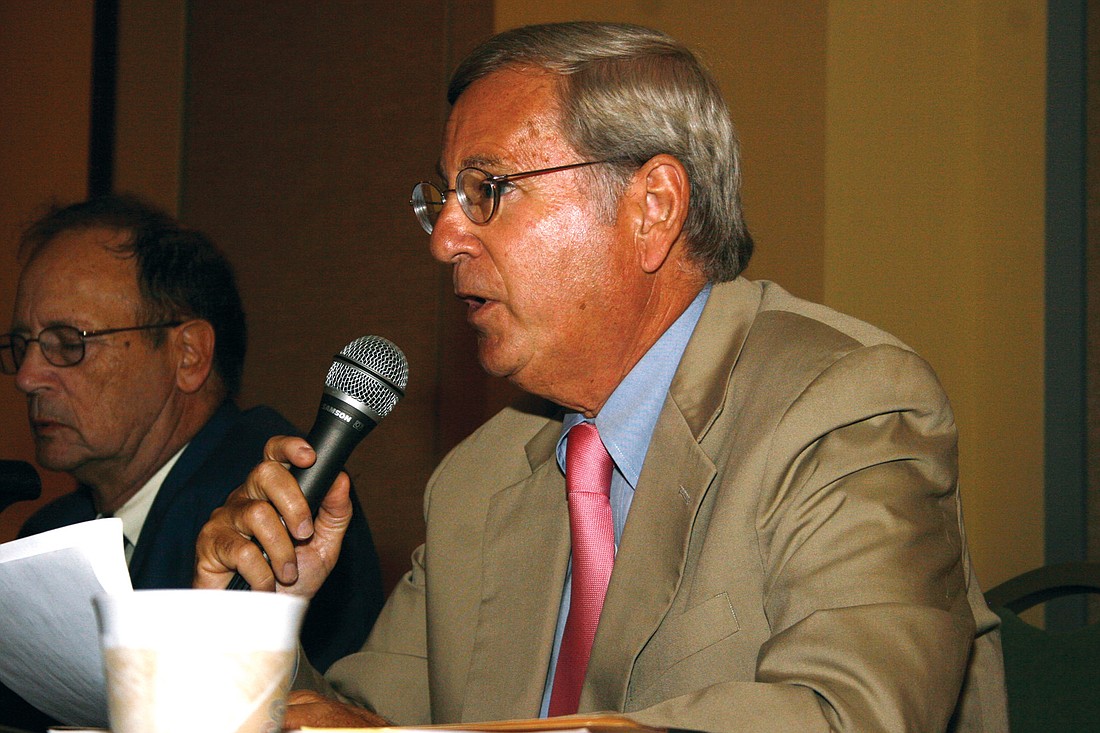- April 25, 2024
-
-
Loading

Loading

In preparation for the New Year the Observer is taking the holiday week to reflect on the big stories of the year. We are counting down the top 12 stories of 2011 for all Observers. Check back each day for a reprinting — and any relevant updates — of the biggest news items of the year. Updates at bottom.
ORIGINALLY PUBLISHED MAY 12, 2011
LAKEWOOD RANCH — The two groups promoting and opposing the incorporation of Lakewood Ranch faced off for the first time during the East County Observer’s Lakewood Ranch Incorporation Debate May 9 at The Polo Grill and Bar Fête Ballroom.
More than 330 people packed into the ballroom as Tom Thomaides and Keith Davey, of the Lakewood Ranch Incorporation Study Committee, and Gary Berns and Bob Hendel, of the Friends of Lakewood Ranch, defended their respective positions and tried to poke holes in their oppositions’ arguments. The East County Observer’s Editorials Page Editor Rod Thomson served as moderator.
In his opening statements, Hendel cited his top 10 reasons for opposing incorporation, including the loss of local control, no savings on taxes and a significant risk taxes will increase, among other concerns.
“We are against this city, at this time, under this charter,” he said.
Thomaides, however, called incorporation “a practical step in a normal evolution” and noted the study committee is the only side of the debate “who began with an open mind” and was willing to abandon efforts if incorporation proved infeasible. He also said the study committee’s task of defending incorporation is more difficult than instilling fear of the unknown.
“They don’t have to prove anything,” Thomaides said. “It is inevitable that one day Lakewood Ranch must seize its own destiny and become its own city. We believe the time is now.”
Proponents of incorporation argued an incorporation feasibility study conducted by economist Dr. Hank Fishkind is reliable and has been validated by independent third-party consultant Dr. Tim Chapin of Florida State University, while anti-incorporators said Fishkind’s work, based on other examples, could not be trusted and chastised the pro-incorporation group for referring to Chapin’s own conclusions as if they were approved by FSU.
Thomaides said the Incorporation Study Committee worked to correct misleading statements on all the group’s documents as soon as they were notified of the problem, and the group did not intentionally misuse the college’s name. He also said the problem does not change Chapin’s conclusions, which validated the Fishkind study.
Berns cited a $70,000 feasibility study Fishkind conducted for Casey Key as a prime example of why the Lakewood Ranch feasibility study should not be trusted. The Casey Key study was deemed useless by state legislators considering the proposal, and it was not approved.
Thomaides, however, argued the two were an “apples to oranges comparison” because Casey Key’s study was intended to discover what would be required to make incorporation feasible — a roughly $2,000 per household increase in taxes, among other components — while the Lakewood Ranch study shows no tax increase would be necessary to become a viable city. He also noted the city of Lakewood Ranch would get only about 10% of its revenues from property taxes, a stark contrast to cities such as Marco Island, which gets 75% of its revenue from property taxes and now is having financial problems.
Friends of Lakewood Ranch debaters also argued the incorporation of Lakewood Ranch would lead to a loss of local control, as the five supervisors elected for each community development district would no longer be required. Instead, five at-large councilmen would represent the entire Lakewood Ranch property, with thousands of more residents in the future. The boundaries of those councilmen would be vastly different than what CDD supervisors oversee today, and councilmen would not be immediate neighbors making decisions on behalf of their neighborhoods.
“We are going to become minority voters,” Hendel said. “We are not today. We don’t want to lose that which we have today.”
Davey and Thomaides, however, argued becoming a city would give residents more local control, allowing councilmen to create a citywide approach to problem solving for issues such as irrigation problems, rather than the piece-meal solutions offered by CDDs today. Advisory boards would give council members directions as to what projects are most important to residents. They also said the city would be able to implement long-term planning for the city, among other benefits.
“We tried to make our point that incorporation will provide much more local control than we have today,” Davey said after the debate. “We tried to answer the questions honestly and provide factual data.”
Hendel said: “I’m very pleased with our presentation. We hope we were able to provide information to the residents that will (help) them make an informed decision.”
Contact Pam Eubanks at [email protected].
UPDATE: Following the debate, the East County Observer published a summer-long investigative series about Lakewood Ranch incorporation. Ultimately, in August, voters in an official straw poll indicated they opposed the idea of incorporation.